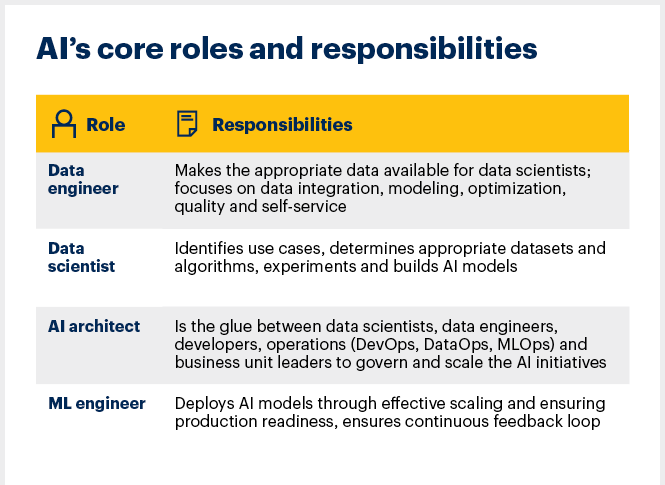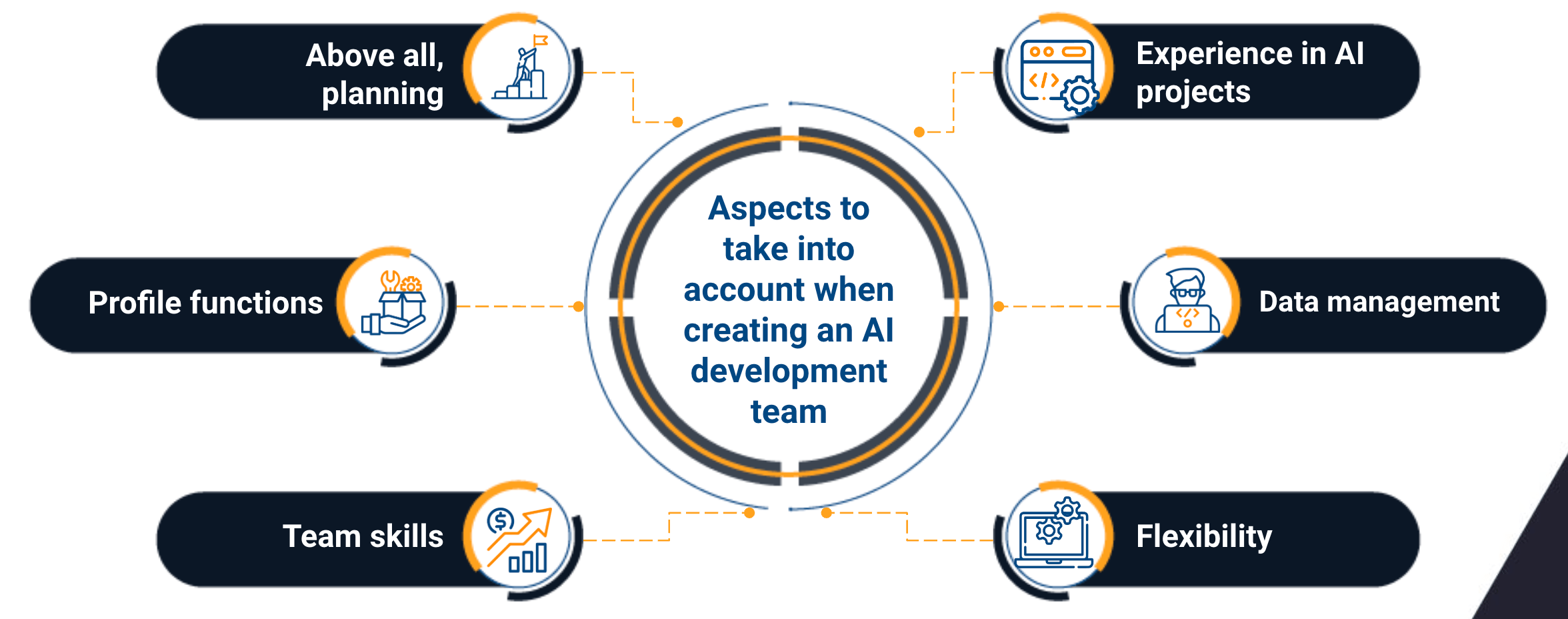Unveiling the Minds Behind AI Advancements
Artificial Intelligence has emerged as a cornerstone of modern technology, revolutionizing industries from healthcare to finance. Behind every successful AI application stands a proficient AI development team, collectively crafting, testing, and refining AI models to achieve remarkable outcomes. The landscape of AI development teams has evolved over the years, and in 2023, it’s marked by specialization, collaboration, and adaptability.The Key Roles in an AI Development Team
 Source
Source
1. AI Researcher/Scientist
At the heart of any AI development team is the AI researcher or scientist. They are responsible for staying abreast of the latest advancements in AI, exploring novel algorithms, and developing innovative solutions to complex problems. Their expertise drives the team’s innovation, guiding the development of AI models that can outperform previous iterations.2. Data Scientist
The data scientist is the architect of data-driven AI models. They curate and preprocess data, identify patterns, and create meaningful features that enable AI models to learn effectively. Data scientists work closely with domain experts to ensure the AI system understands the nuances of the industry it’s being applied to.3. Machine Learning Engineer
These engineers transform AI research into practical applications. They design and implement machine learning pipelines, integrating data, models, and deployment systems. Machine learning engineers bridge the gap between research and real-world applications, optimizing models for scalability and performance.4. Software Engineer
AI solutions are often integrated into software applications. Software engineers ensure that AI models seamlessly integrate with existing systems, providing a user-friendly experience. They focus on the technical aspects of deployment, ensuring stability, security, and efficiency.5. Domain Expert
Understanding the context in which AI will be applied is crucial. Domain experts provide insights into industry-specific challenges, opportunities, and requirements. Their expertise helps shape the AI model’s objectives and evaluation metrics, ensuring practicality and relevance.6. Ethics Specialist
As AI’s influence grows, so does the need for ethical considerations. Ethics specialists in AI development teams ensure that the technology is developed and deployed responsibly, taking into account potential biases, privacy concerns, and societal impacts.7. Product Designer
The user experience is paramount in AI applications. Product designers collaborate with the team to create intuitive interfaces that allow users to interact seamlessly with AI-powered features, enhancing usability and adoption.8. Data Engineer
Behind every successful AI model is a robust data infrastructure. Data engineers design and maintain the pipelines that collect, store, and preprocess the data that AI systems rely on. Their work is crucial for ensuring data quality and accessibility.9. IT Leader
AI development requires a robust IT infrastructure. IT leaders oversee the technical aspects of the team’s operations, managing hardware, software, security, and network resources to create a stable environment for development and deployment.The Adaptive Structure of AI Development Teams
 Source
AI development teams in 2023 often follow an adaptive structure that caters to the dynamic nature of AI innovation:
Source
AI development teams in 2023 often follow an adaptive structure that caters to the dynamic nature of AI innovation:
1. Agile Methodology
Agile practices, with their iterative and collaborative approach, are embraced by AI development teams. These methodologies allow teams to quickly respond to changing requirements and incorporate feedback.2. Provide Learning Opportunities
AI is a rapidly evolving field. Encourage continuous learning by providing resources for team members to stay updated with the latest trends, technologies, and research in AI.3. Define Roles and Responsibilities
Clearly define the roles and responsibilities of each team member. This reduces confusion and make sures that everyone knows their contribution to the project’s success.4. Cross-Functional Teams
AI projects benefit from diverse perspectives. Cross-functional teams comprising researchers, data scientists, engineers, domain experts, and ethicists collaborate to ensure well-rounded development.5. Invest in Tools and Infrastructure
Provide your team with the necessary tools, software, and hardware required for efficient AI development. A robust IT infrastructure is essential for data processing, model training, and deployment.6. Emphasize Ethical Considerations
Ethical considerations are vital in AI development. Ensure that your team includes ethics specialists who can guide the development process to avoid biases, uphold privacy, and maintain responsible AI deployment.7. Remote Collaboration
The global talent pool has become accessible through remote work. Teams can now include experts from various parts of the world, fostering innovation through diverse experiences and viewpoints.8. Provide Leadership and Support
Appoint a capable leader who understands AI intricacies and can provide guidance to the team. Leadership ensures smooth coordination, efficient decision-making, and effective resolution of challenges.9. Foster a Positive Work Culture
Create a work environment that encourages creativity, open communication, and mutual respect. A positive culture boosts team morale and contributes to better outcomes.10. Measure and Iterate
Regularly assess the team’s progress and the project’s milestones. Adjust your strategies based on feedback and results to continuously improve the team’s performance. Remember, there might not be a universally “perfect” AI team, as different projects have varying requirements. However, by following these steps and tailoring them to your specific context, you can assemble a skilled, collaborative, and innovative AI team that drives successful projects and advancements in the field.FAQs
Collaboration is key. AI development is an interdisciplinary effort where researchers provide algorithms, data scientists feed them with quality data, machine learning engineers implement models, software engineers integrate them, domain experts contextualize, and ethics specialists ensure responsible development.
Core skills include programming (Python, TensorFlow, PyTorch), machine learning expertise, data manipulation, problem-solving, and domain-specific knowledge. Soft skills like collaboration, communication and problem solving are equally important as any other technical skill.
Previously, linear structures have shifted to more dynamic ones. Cross-functional teams encourage interaction, iterative development, and faster innovation. Remote work and global talent have also influenced team composition.
Challenges include data quality and quantity, model interpretability, ethical concerns, and staying updated with rapid advancements. Ensuring that AI benefits all stakeholders and avoids biases is a growing challenge.
Conclusion: Pioneering AI Through Collaborative Excellence
AI development teams in 2023 are at the forefront of innovation, harnessing the power of collaboration and specialization. The roles within these teams synergize to create AI solutions that redefine industries and push technological boundaries. As AI continues to transform our world, these teams will play a vital role in shaping the responsible and ethical development of ML & AI applications.
In a world where the possibilities of AI seem boundless, it’s the minds and expertise of these development teams that navigate the challenges and transform possibilities into realities. The future of AI is not just about advanced algorithms; it’s about the passionate individuals who come together to create a better future for us all.

